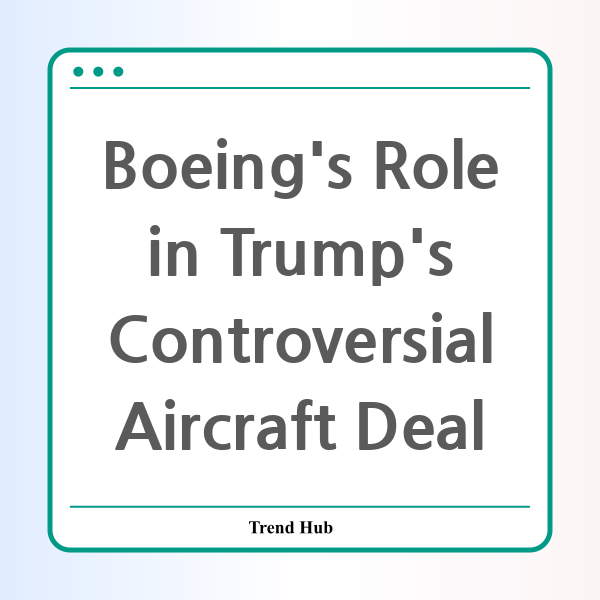* This website participates in the Amazon Affiliate Program and earns from qualifying purchases.

Have you ever wondered how a luxury aircraft from Qatar could become a point of contention in U.S. politics? The recent discussions surrounding a proposed $400 million Boeing 747 from Qatar have sparked debate, not only about the aircraft itself but also about broader implications regarding American prestige and national security.
Donald Trump has staunchly defended his interest in accepting this luxury jet, suggesting that it represents an invaluable opportunity for the United States. During a recent interview, Trump stated, "The plane that you’re on is almost 40 years old," emphasizing the need for modernizing Air Force One to reflect American stature on the world stage. Many view this offer from Qatar, especially in light of Trump's prior business engagements in the region, with skepticism.
The complexities surrounding the potential conversion of a 13-year-old commercial jet into an official Air Force One are staggering. Aviation experts have vividly described the logistics of such an undertaking, estimating it could exceed $1 billion and take years to realize. The process involves extensive modifications, including the installation of secure communication systems crucial for presidential capabilities during emergencies.
The Concerns Raised
The juxtaposition of this aircraft deal against the backdrop of the emoluments clause raises pertinent questions. Critics worry that accepting such a gift from a foreign government could lead to conflicts of interest, or even worse, espionage risks. These concerns are further ignited by the fact that ensuring the security of the plane involves thorough dismantling to eliminate any foreign surveillance devices.
The president's visit to Qatar coincides with a new business venture between the Trump Organization and Qatari investors, raising eyebrows over possible motivations behind accepting the plane. Trump’s Gulf trip included participation in the Saudi US Investment Forum 2025, where he praised regional leaders, reinforcing Qatari ties.
The Financial and Practical Implications
Experts have indicated that refurbishing the Qatari 747 could ultimately lead to costs far exceeding the current market value of the jet. With Boeing currently engaged in a separate project to convert two new 747 jets for Air Force One, many question the practicality of this additional undertaking. In fact, both timing and financial feasibility have been major topics of discussion among aviation analysts.
Richard Aboulafia from AeroDynamic Advisory explained that transforming the Qatari jet would necessitate substantial rewiring and retrofitting, involving high-level security requirements. Experts estimate that preparing the aircraft could push the completion timeline into the 2030s, raising the question of who would ultimately benefit from such an arrangement.
Conclusion: A Complicated Airborne Future
The notion of turning a Qatari Boeing 747 into Air Force One is not just a technical challenge; it encapsulates deeper issues of governance, foreign relations, and national security. The looming question remains: Is this a savvy move to modernize American prestige, or a precarious gamble that could lead to unforeseen complications?
While the aviation industry certainly stands to gain from any contract awarded for this conversion, the implications for American politics and security policy warrant careful evaluation. As the story unfolds, it remains critical for the public and lawmakers alike to scrutinize the potential ramifications of such significant diplomatic gestures.
* This website participates in the Amazon Affiliate Program and earns from qualifying purchases.